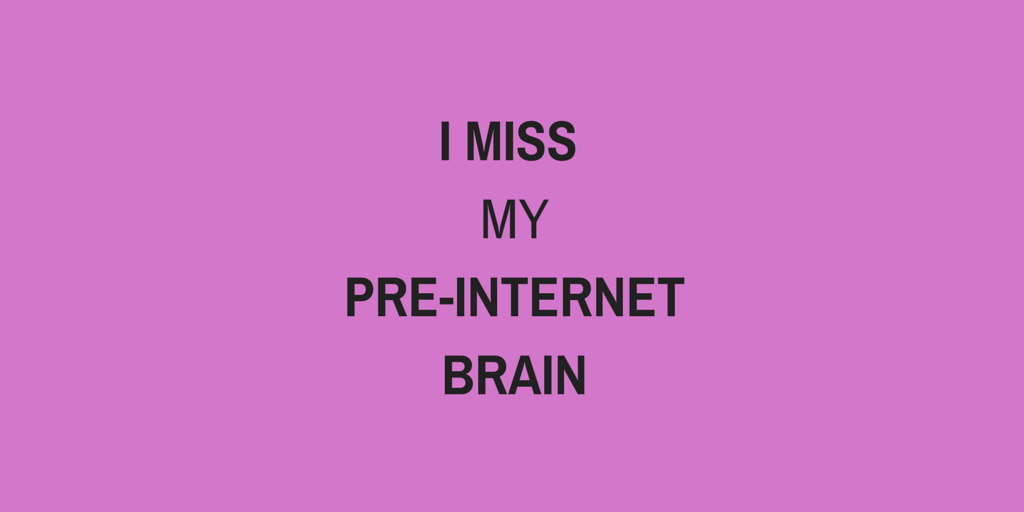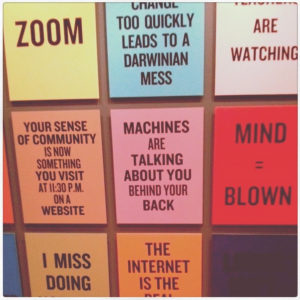Do You Remember Your Pre-Internet Brain?
“In the last few years I’ve been saying I miss my pre-Internet brain, and I think people know what I mean. And then lately I’ve been realizing I no longer even remember my pre-Internet brain. This technology has rewired my own brain, and I mean that in a genuine neurological sense, but it’s also rewired everyone else’s brain the same way.”
– Douglas Coupland
As we know from our course, Douglas Coupland is not the only person to comment on the way the internet has impacted our thinking. Michael Wesch’s video, “Information R/evolution,” shows how digital information is different than written information. Consequently, the way we think of information is different as well.
In the digital world, hypertext it is now common cultural knowledge (Boulter, 15) and it’s uses permits us to be able to link massive amounts of information. Whereas, in the pre-digital world people were the concerned about recording information and thoughts, now the concerns are about the overwhelming amount of information which is available. There is much more information readily available than our minds are able assimilate. We are able to navigate the web and selectively choose the information that we want to “consume”. As mentioned in our class materials, “children who grow up using ThinkTank, or similar programs, may develop the capacity to handle large amounts of information, and to structure it at an early age” (UBC, 2015).
It is notable that writing for the Internet tends to be more concise, linked, and “layered” to facilitate quick access and web surfing. Boulter and Kress both have acknowledged that visual representation is dominating over textual representation on the web (UBC, 2015). For example, “Bolter identifies a tension between textual and visual modes of representation” (UBC, 2015). Because of this many people are concerned about how some of the affordances of the web are impacting our brains by:
- the focus being on “consuming” information rather than writing it down,
- the quality of the writing which is read online, and
- the dominance of visual over written online.
Another social impact, which is an outcome of the vast information available online, is the “do-it-yourself culture” and the “maker” movement. Some people see the online information and knowledge as enabling more people to create and fix things without depending on specialists. Yet others see this as the loss of expertise and an in increase in “mass amateurization”. An expert is any field is someone who has many, many years of experience which they have been able to gain a deep knowledge about a subject. Neurologically, an expert build neural pathways, which are re-enforced over time. The “do-it-yourselfers” as they gain new knowledge build new neural pathways in their brain. It’s it hard to say if one is better or worse. But the brain is definitely “wired” differently in both instances.
References
Bolter, J. D. (2001). Writing space: Computers, hypertext, and the remediation of print. Routledge
Bush, V. (1945). As we may think. The Atlantic Monthly, 176(1), 101-108. Available: http://www.theatlantic.com/doc/194507/bush
UBC (2015). Module 4: Literacy and the New Media. [Class lecture].Retrieved from: https://connect.ubc.ca/



Definitely a Douglas Coupland fan here, really enjoy reading his work and insights on vastly different topics. The brain for sure has been rewired for the consumption and ability to sort through so much information it has to organize in order to find relevant content. Maybe this is just a sort of evolution happening as we adapt to new technology. I like the concepts of some futurists describing this brain rewiring as a sort of offloading of information from our memories that we have come accustomed to having quick access through computers and phones. I think this is what makes is difficult for people to stop using technology we have become used to interacting with. Almost like out brain has lost a peripheral or a memory upgrade we used to have has been removed. Interesting topic to theorize on for sure.
This is a fantastic post! So insightful and has me wanting to read into it more! I think it’s fascinating how we are evolving as thinkers and doers- and how empowering it is to have so much information available at the click of a mouse. I am a big DIY fan (and, ultimately, cheap). If I can do it myself, I would much rather conquer that and gain the satisfaction that I taught myself how to complete something.
I remember how shocked I was when “let’s just google it” became a phrase my parents would say ALL THE TIME! What happened to “Let’s look it up in the Encyclopedia Britannica?” – How we access information and where that information is stored will continue to change and I think this is very exciting!